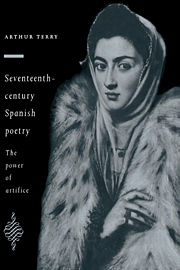Book contents
- Frontmatter
- Contents
- Preface
- List of abbreviations
- 1 The inheritance
- 2 Theory and practice
- 3 Luis de Góngora: the poetry of transformation
- 4 Lope de Vega: re-writing a life
- 5 Between two centuries: from Medrano to Valdivielso
- 6 Francisco de Quevedo: the force of eloquence
- 7 The literary epic
- 8 Plenitude and decline: from Villamediana to the second half of the century
- 9 Sor Juana Inés de la Cruz: the end of a tradition
- Epilogue
- Notes
- Select bibliography
- Index
4 - Lope de Vega: re-writing a life
Published online by Cambridge University Press: 01 October 2009
- Frontmatter
- Contents
- Preface
- List of abbreviations
- 1 The inheritance
- 2 Theory and practice
- 3 Luis de Góngora: the poetry of transformation
- 4 Lope de Vega: re-writing a life
- 5 Between two centuries: from Medrano to Valdivielso
- 6 Francisco de Quevedo: the force of eloquence
- 7 The literary epic
- 8 Plenitude and decline: from Villamediana to the second half of the century
- 9 Sor Juana Inés de la Cruz: the end of a tradition
- Epilogue
- Notes
- Select bibliography
- Index
Summary
The careers of Góngora and Lope de Vega (1562–1635) run in a kind of counterpoint, often amounting to open rivalry. Certain differences immediately stand out: where Góngora is almost exclusively a poet, Lope is also the leading dramatist of his generation, as well as the author of several works of prose fiction; unlike Góngora, whose collected poems were never published in his lifetime, Lope is a professional writer, whose volumes of verse appear at frequent intervals from 1602 onwards. Other differences take the form of polarities: mass literature – the theatre – versus minority literature, Castilian (often equated with ‘Spanish’) versus Andalusian, and, more tentatively, the confessional as against the reticent. Not all of these contrasts, as we shall see, are absolute – much of Lope's poetic activity, for example, was aimed at the same minority audience as Góngora's – yet, taken together, they at least suggest the lines of force which were to dominate Spanish poetry in the first decades of the seventeenth century.
What is debatable here is the term ‘confessional’ – a word often used to describe Lope's seemingly inexhaustible ability to turn the events of a turbulent life more or less directly into verse. From a literary point of view, such events – two marriages, interspersed with a number of extra-marital relationships; a series of spiritual crises, both before and after his entering the priesthood – seem inseparable from his extraordinary energy as a writer.
- Type
- Chapter
- Information
- Seventeenth-Century Spanish Poetry , pp. 94 - 121Publisher: Cambridge University PressPrint publication year: 1993
- 2
- Cited by



